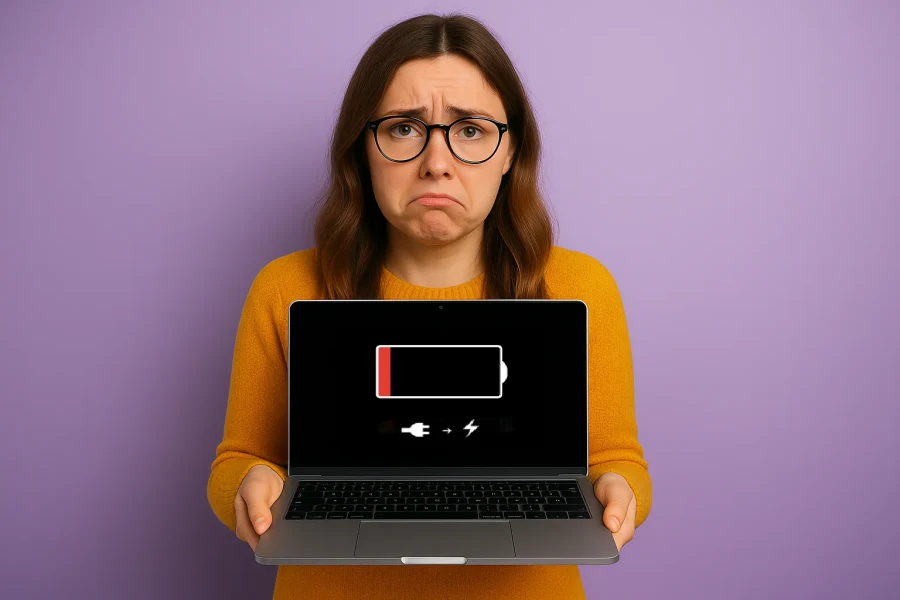Is your laptop battery not charging? That “plugged in, not charging” message can be frustrating. Don’t panic—most charging issues have simple fixes.
Table of Contents
Common Causes
Hardware Issues:
- Connection Problems: Loose cables, faulty outlets, or dirty charging ports
- Battery Degradation: Worn-out or unrecognized batteries
- Hardware Failures: Damaged charging circuits
- Wrong Port: Using a data-only USB-C port instead of a charging one
Software Issues:
- Driver Problems: Outdated or corrupted battery drivers
- Power Settings: Incorrect power management configurations
Environmental Factors:
- Overheating: Heat can halt charging as a safety measure
- Wrong Charger: Insufficient wattage from the charger
Step-by-Step Troubleshooting
1. Basic Checks
Verify Connections:
- Ensure charger is firmly plugged into laptop and wall outlet
- Try different outlets
- Check cable for damage or fraying
- Clean charging port with compressed air
Check Correct Port:
- Use the designated charging port (look for charging icons)
- For USB-C laptops, try all USB-C ports
Validate Charger:
- Use the original charger or certified replacement
- Check wattage matches your laptop’s requirements
2. Software Solutions
Update Drivers (Windows):
- Open Device Manager
- Expand “Batteries”
- Right-click battery driver and select “Update driver”
Reset Power Settings:
- Windows: Settings > System > Power & sleep > Additional power settings
- Mac: System Preferences > Energy Saver
Run Diagnostics:
- Windows: Settings > System > Troubleshoot > Power troubleshooter
- Mac: Reset SMC (System Management Controller)
3. Advanced Checks
Check Battery Health:
Windows:
- Open Command Prompt as Administrator
- Run:
powercfg /batteryreport - Check the generated report for battery capacity
Mac:
- Hold Option key + click Apple menu
- Select “System Information” > “Power”
- Check “Cycle Count” and “Condition”
Temperature Check:
- Ensure laptop vents are clear
- Use on hard surfaces for better airflow
- Let laptop cool down if overheating
Still having charging issues? Maybe it's time for an upgrade! Find the perfect laptop that meets your needs and budget with our smart recommendation tool.
Find Your Perfect Laptop Now
When to Call a Professional
Immediate Professional Help Required:
- Battery swelling or leakage
- Burn marks or unusual odors
- Physical port damage (bent pins, cracks)
- Sparking or electrical issues
Consider Professional Service When:
- Multiple troubleshooting attempts fail
- Laptop is still under warranty
- You’re not comfortable with technical steps
When to Replace Your Laptop
Consider Replacement When:
- Age: Laptop is 5+ years old and repair costs exceed 50% of a new laptop’s price
- Multiple Failures: Battery, charging port, and other components are failing simultaneously
- Performance Issues: Even after fixing charging, the laptop is too slow for your needs
- Repair Cost: Battery replacement + charging port repair costs more than $300-400
Financial Calculation:
- Compare repair cost vs. new laptop cost
- Factor in your laptop’s current market value
- Consider if other components might fail soon
Signs It’s Time to Upgrade:
- Constant overheating despite cleaning
- Outdated ports (no USB-C, limited connectivity)
- Can’t run current software efficiently
- Screen, keyboard, or trackpad also showing wear
Quick Summary
Most Common Fixes:
- Check all connections and try different outlets
- Update battery drivers
- Reset power settings
- Clean charging ports
- Verify you’re using the correct charger
If these steps don’t work, the issue is likely hardware-related and requires professional repair or laptop replacement.
Still having charging issues? Maybe it's time for an upgrade! Find the perfect laptop that meets your needs and budget with our smart recommendation tool.
Find Your Perfect Laptop Now
